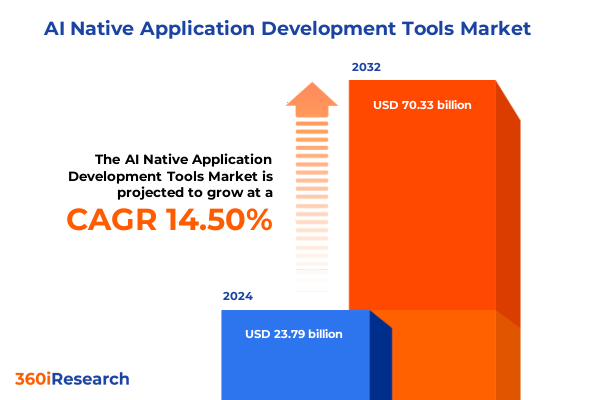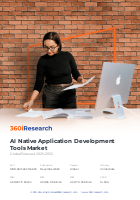The AI Native Application Development Tools Market size was estimated at USD 26.99 billion in 2025 and expected to reach USD 30.73 billion in 2026, at a CAGR of 14.66% to reach USD 70.33 billion by 2032.

Unleashing the Potential of AI-Native Development Platforms to Revolutionize Software Creation Workflows Worldwide and Accelerate Business Innovation
The realm of software development is undergoing a profound reinvention as AI native development platforms move from experimental prototypes to mission-critical infrastructure. These platforms, which integrate generative AI, MLOps pipelines, and real-time analytics, are fundamentally altering how development teams conceive architect test and deploy applications. By embedding intelligence directly into every phase of the software lifecycle organizations are achieving unprecedented speed and sophistication in creating customer experiences and enterprise workflows. Moreover this evolution is not confined to specialist labs or elite research institutions but is increasingly accessible via cloud services no-code interfaces and modular toolkits fostering cross-functional collaboration and innovation.
Discover the Pivotal Technological Breakthroughs and Methodological Innovations Reshaping the AI Native Development Ecosystem
Developers are embracing 'vibe coding' where natural language prompts generate functional code transforming idea-to-prototype cycles from days to minutes. This shift lowers the barrier to entry for domain experts and non-traditional programmers enabling rapid experimentation in emerging fields such as personalized healthcare and advanced financial services. Concurrently autonomous agents powered by agentic AI are assuming active roles in continuous integration and continuous delivery pipelines orchestrating tasks such as testing refactoring and deployment with minimal human intervention. Gartner highlights these autonomous assistants as a defining trend for 2025 promising scalable automation of complex engineering workflows.
Analyzing the Comprehensive Consequences of 2025 US Trade Levies on AI Application Development Infrastructure and Ecosystem Dynamics
The imposition of broad reciprocal tariffs by the U S administration in early 2025 has reverberated across the AI development ecosystem driving up hardware costs by as much as 25 percent on critical components such as GPUs and specialized networking equipment. These levies have introduced immediate inflationary pressures on infrastructure procurement with projects experiencing budget overruns and timeline delays as supply chain disruptions ripple through data center construction efforts.
Uncovering In-Depth Insights from Component to Organizational Layers That Define AI Application Development Market Segments
A nuanced segmentation of the market reveals that Services encompassing consulting integration and support are commanding premium fees as enterprises seek expert guidance to navigate complex AI implementations while Tools such as deployment design and testing frameworks are prioritized by teams aiming to internalize development cycles. Pricing models exhibit bifurcation with pay-as-you-go and usage-based tiers favored by startups demanding cost agility while subscription and perpetual licensing structures appeal to established organizations focused on predictable operational expenditure. Applications ranging from chatbots and virtual assistants to recommendation engines and robotic process automation showcase diverse adoption curves with personalized solutions gaining traction in consumer- facing sectors. Deployment models split between cloud and on-premises environments underscore a hybrid pivot as organizations balance scalability and data sovereignty mandates. Vertically the demand varies from financial institutions pursuing fraud detection to healthcare providers integrating predictive analytics alongside manufacturers optimizing processes with automation. Enterprise size also influences procurement choices as large corporations leverage comprehensive end-to-end platforms while small and medium businesses adopt modular low-code components to accelerate time-to-value.
This comprehensive research report categorizes the AI Native Application Development Tools market into clearly defined segments, providing a detailed analysis of emerging trends and precise revenue forecasts to support strategic decision-making.
- Component
- Pricing Model
- Application
- Deployment Model
- Industry Vertical
- Organization Size
Examining Unmatched Adoption Variances and Infrastructure Dynamics Across the Americas Europe Middle East Africa and Asia Pacific AI Development Ecosystems
In the Americas digital transformation initiatives are well advanced driven by mature cloud ecosystems and substantial investment in artificial intelligence research and development. Leading technology hubs in the United States and Canada are rapidly integrating AI development platforms within sectors such as finance retail and telecommunications amplifying efficiency and customer engagement metrics. Across Europe the Middle East and Africa regulatory frameworks like GDPR and evolving data sovereignty requirements are influencing the balance between cloud adoption and on-premises deployments. Organizations in these regions are increasingly customizing solutions for industry verticals such as manufacturing and healthcare to align with strict compliance standards and local market nuances. Meanwhile the Asia Pacific region is witnessing the fastest expansion fueled by government-led AI programs in China India Japan and South Korea. Here local providers are blending open-source innovations with global toolkits to serve a broad spectrum from startups inventing the next generation of chatbots to conglomerates deploying large-scale automation across supply chains.
This comprehensive research report examines key regions that drive the evolution of the AI Native Application Development Tools market, offering deep insights into regional trends, growth factors, and industry developments that are influencing market performance.
- Americas
- Europe, Middle East & Africa
- Asia-Pacific
Profiling Leading Technology Providers Advancing AI Native Development with Strategic Toolchains and Innovative Service Offerings
Amazon Web Services has taken a leadership position by introducing AgentCore within its Bedrock platform delivering modular runtime memory and identity services that streamline the orchestration of intelligent agents at scale. This offering builds on the momentum of AWS machine learning services and underscores the shift towards platform-driven AI development. Google’s Firebase evolution into an AI-native IDE featuring deep integrations with Vertex AI exemplifies how cloud providers are enabling code generation with a single sentence input and embedding security and compliance checks directly within development workflows. Microsoft Azure’s AI suite continues to expand with Fabric and AI Foundry offering unified analytics and model management capabilities catering to enterprise clients prioritizing end-to-end lifecycle governance.
This comprehensive research report delivers an in-depth overview of the principal market players in the AI Native Application Development Tools market, evaluating their market share, strategic initiatives, and competitive positioning to illuminate the factors shaping the competitive landscape.
- ABBYY Development Inc.
- Adobe Inc.
- Amazon.com, Inc.
- Anthropic PBC
- Argodesign LLC
- C3.ai, Inc.
- Cisco Systems, Inc.
- DataArt Solutions, Inc.
- Databricks Inc.
- Dataiku Inc.
- DataRobot Inc.
- Google LLC by Alphabet Inc.
- H2O.ai, Inc.
- Hugging Face, Inc.
- International Business Machines Corporation
- LeewayHertz by Hackett Group
- Microsoft Corporation
- NVIDIA Corporation
- OpenAI Inc.
- Oracle Corporation
- Palantir Technologies Inc.
- Salesforce, Inc.
- SAP SE
- ServiceNow, Inc.
- Techahead Software Private Limited
- TIBCO Software Inc.
- UiPath Inc.
- Yellow Corporation
Strategic Recommendations for Industry Leaders to Harness AI Native Tools with Agility Governance and Scalable Architectures
Leaders should incorporate generative AI capabilities directly into integrated development environments to foster rapid prototyping and seamless collaboration between business and engineering teams. Adopting standardized protocols such as the emerging Model Context Protocol will mitigate toolchain fragmentation and accelerate cross-platform interoperability. Furthermore establishing a balanced hybrid deployment strategy that leverages both cloud scalability and on-premises control will help manage data sovereignty requirements while optimizing cost structures. It is also critical to diversify supplier relationships to hedge against trade policy uncertainties by developing nearshore and local partnerships for key hardware components and service delivery. Lastly strengthening internal AI literacy through targeted training programs and domain-specific model fine-tuning will position organizations to capture the full strategic value of AI native development tools.
Detailing the Rigorous Research Framework Leveraging Expert Inputs and Data Triangulation to Validate AI Native Development Findings
This research synthesizes primary interviews with C-level executives technology architects and development leads across North America Europe and Asia Pacific to capture real-world application insights. Secondary research encompassed analysis of industry whitepapers regulatory filings and vendor documentation to contextualize technology trends and tariff developments. Data triangulation techniques were applied by cross-referencing quantitative survey data from technology users with qualitative feedback from expert panels. Segmentation frameworks were validated through case studies in diverse industries while regional assessments leveraged macroeconomic indicators and trade policy reports. The methodology ensures the report’s findings reflect a holistic view of market dynamics and emerging opportunities within the AI native application development space.
This section provides a structured overview of the report, outlining key chapters and topics covered for easy reference in our AI Native Application Development Tools market comprehensive research report.
- Preface
- Research Methodology
- Executive Summary
- Market Overview
- Market Insights
- Cumulative Impact of United States Tariffs 2025
- Cumulative Impact of Artificial Intelligence 2025
- AI Native Application Development Tools Market, by Component
- AI Native Application Development Tools Market, by Pricing Model
- AI Native Application Development Tools Market, by Application
- AI Native Application Development Tools Market, by Deployment Model
- AI Native Application Development Tools Market, by Industry Vertical
- AI Native Application Development Tools Market, by Organization Size
- AI Native Application Development Tools Market, by Region
- AI Native Application Development Tools Market, by Group
- AI Native Application Development Tools Market, by Country
- United States AI Native Application Development Tools Market
- China AI Native Application Development Tools Market
- Competitive Landscape
- List of Figures [Total: 18]
- List of Tables [Total: 1908 ]
Concluding Perspectives Synthesizing AI Native Development Trends Impacts and Strategic Imperatives for Forward Looking Leaders
The convergence of generative AI, agentic automation and hybrid deployment models is redefining the boundaries of software engineering. Organizations that strategically invest in integrated platforms prioritize open standards and foster AI proficiency among their workforce will gain tangible advantages in speed innovation and cost management. Meanwhile evolving tariff landscapes underscore the importance of supply chain resilience and diversified procurement strategies. As the market matures, leaders who embrace a balanced approach that blends technological capabilities with governance and ethical considerations will be best positioned to deliver robust intelligent applications and maintain competitive differentiation in a rapidly shifting digital economy.
Take Action Today to Engage with Associate Director Ketan Rohom and Secure the Definitive AI Native Application Development Tools Market Report
To explore these compelling insights in greater depth and tailor them to your specific strategic objectives, connect with Ketan Rohom Associate Director Sales & Marketing at 360iResearch today. His expertise will guide you through the report’s rich findings align them to your organizational priorities and ensure you capitalize on emerging opportunities in the AI native application development landscape. Reach out now to secure access to the definitive research report and gain a competitive edge with actionable data-driven intelligence.

- How big is the AI Native Application Development Tools Market?
- What is the AI Native Application Development Tools Market growth?
- When do I get the report?
- In what format does this report get delivered to me?
- How long has 360iResearch been around?
- What if I have a question about your reports?
- Can I share this report with my team?
- Can I use your research in my presentation?




